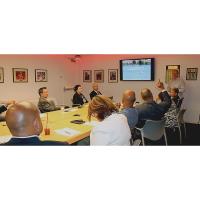Metropolitan Board Officially Endorses California Waterfix
Metropolitan Board officially endorses California Waterfix, approves Southern California’s $4.3-Billion share of the project. An initiative supported by the Hollywood Chamber of Commerce, California WaterFix’s new water intakes, twin tunnels in Delta would help secure future water reliability for Southland, address climate change.
The biggest water decision of this generation of Southern Californians was reached today as Metropolitan Water District’s Board of Directors voted to support a state-federal project to modernize the state water system and help improve supply reliability for the Southland.
Metropolitan’s board approved the district’s 26 percent share of financing the California WaterFix project as well as moving forward on a governance structure to build and finance the $17 billion project. Metropolitan’s share is about $4.3 billion.
“Every generation of Southern Californians has to reinvest in our water system to ensure a reliable water future. Today marks one of those historic votes that reaffirms that commitment and vision,” Metropolitan Board Chairman Randy Record said. “We simply must modernize and improve the reliability of our imported supplies as well as meet the needs of growth by developing more local supplies and extending conservation.”
About 30 percent of the water that flows out of taps in Southern California comes from Northern California via the Sacramento-San Joaquin Delta. The Delta's delivery system, however, is badly outdated, a problem compounded both by a declining ecosystem that is harmful to fish and a 1,100-mile levee system that is increasingly vulnerable to earthquakes, flooding, saltwater intrusion, climate change and environmental degradation.
California WaterFix would modernize the decades-old delivery system by building three new intakes in the northern Delta along with two tunnels to carry water to the existing aqueduct system in the southern Delta.
“Given our size, Metropolitan is the anchor tenant for any successful California WaterFix, and this vote puts us on record as being ready and willing to participate. We still have a ways to go before we have a final, fully funded project, but this vote keeps WaterFix on the path to finding a viable and lasting solution,” Metropolitan General Manager Jeffrey Kightlinger said.
Today’s board vote follows more than a decade of planning, preliminary design, environmental analysis, regulatory review and public input. It also concludes several months of public review by Metropolitan’s board, including discussions in July and August on a series of policy white papers examining the project’s construction, operations, benefits and cost. During this open and transparent vetting, Metropolitan has received hundreds of public comments and letters on the project, responding to dozens of inquiries in a 28-page document.
Along with approving Metropolitan’s level of investment from the proposed project, the board today also voted to finalize the project’s governance structures; participate in an adaptive management program; and to join separate joint power authorities to oversee construction and finance.
With the board’s action, Metropolitan becomes the latest water agency in the state to approve participation in California WaterFix. Among State Water Contractors, the boards of Zone 7 Water Agency, Mojave Water Agency, San Gorgonio Pass Water Agency, Desert Water Agency, San Bernardino Municipal Water District and Crestline-Lake Arrowhead Water Agency have all voted to support the project. Kern County Water Agency’s board is scheduled to vote on California WaterFix this Thursday, Oct. 12, with other agencies scheduled to follow.
Following the votes by the participating water agencies to identify the initial level of investment, Metropolitan expects further deliberations to identify how to move forward with the proposed existing project, consider phasing the existing project or no project. Any additional level of investment by Metropolitan would require further action by the district’s board.
The Metropolitan Water District of Southern California is a state-established cooperative of 26 cities and water agencies serving nearly 19 million people in six counties. The district imports water from the Colorado River and Northern California to supplement local supplies, and helps its members to develop increased water conservation, recycling, storage and other resource-management programs.
-
Hollywood Chamber
- October 10, 2017
- (323) 469-8311
- Send Email

